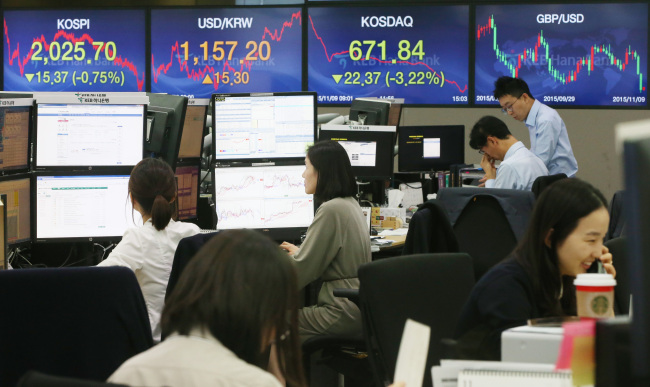The U.S. dollar rose sharply in the local market as the majority of global investment banks -- in their recent projections -- tilted toward the possibility that the Federal Reserve will raise the base rate next month.
The shift, from the formerly growing outlook on a hike delay, was due to the marked improvement in the U.S. employment and some other indices. On Monday, the dollar surged 1.33 percent, or 15.3 won, from a trading session before to close at 1,157.2 won.
This is the highest level in a month since it reached 1,159 won on Oct. 8. The greenback traded between the 1,128 and 1,144 mark over the past two weeks.
 |
A board in the trading room at KEB Hana Bank in Seoul shows the drops in Korean currency and stocks on Monday. (Yonhap) |
“There is a high possibility that the dollar will post a stronger positon in the coming weeks as rate hikes in the U.S. will be conducted in any case (irrespective of the timing),” said Kyobo Securities senior researcher Kim Hyung-ryeol.
Analysts from currency research firms including Samsung Futures and Hana Futures forecast that the dollar could surpass the 1,160 mark this week.
Korea Center for International Finance raised the need to attend “the consumer sales index in the U.S., which is to be publicized this week.”
While an improvement in the consumption index would back up the possibility of a hike in December, a weaker-than-expected growth may again invite uncertainty in the hike timing, according to local think tanks.
An analyst from LG Economic Research Institute said that “(despite the potential hike in the U.S.) the dollar is not projected to rapidly reach the 1,200-won mark, as Korea’s third-quarter gross domestic product posted relatively robust (better-than-expected) growth.”
In the first half of 2016, the FOMC for rate-setting is scheduled to convene four times -- Jan. 26-27, March 15-16, April 26-27 and June 14-15 in Washington.
The local currency also showed weakness versus the euro, Japanese yen and the Chinese yuan on the day.
Korean stocks dropped for the third consecutive trading session. The benchmark KOSPI lost 15.37 points or 0.75 percent from a session earlier to end at 2,025.7 on Monday.
The secondary KOSDAQ fell sharply to 671.84 amid net-selling of both foreigners and local institutions. It lost 22.37 points or 3.22 percent.
Kim Yon-se (
kys@heraldcorp.com)








![[Weekender] Korea's traditional sauce culture gains global recognition](http://res.heraldm.com/phpwas/restmb_idxmake.php?idx=644&simg=/content/image/2024/11/21/20241121050153_0.jpg)